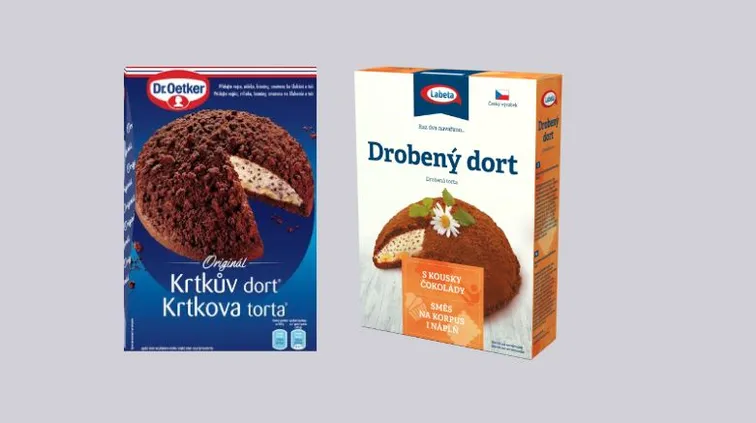What comes to your mind when you hear Mole Cake?
This is how one could sum up a dispute between two well-known producers of baking powder mixtures – the food industry Goliath, Dr. Oetker (as plaintiff), against the Czech David, Labeta (as defendant). And it was the depiction of the dessert in the form of a molehill on the box of Labeta’s Crumb Cake that was the imaginary apple of discord.
The question was seemingly simple – can one undertaking deny others the right to use a depiction of a cake in the shape of a spherical cap?
The Regional Court in Hradec Králové was of the opinion that the answer is “yes”. In the first instance, the Court upheld Dr. Oetker’s action and prohibited Labeta from marketing the Crumb Cake in packaging which, on the front, presented a depiction of a cake in the shape of a spherical cap or, alternatively, a spherical cap with a cut. (For those of us who are not familiar with mathematical terms - a molehill can be expressed mathematically as a spherical sap; Wikipedia refers to a portion of a sphere cut off by a plane.)
The court of first instance found that Dr. Oetker and Labeta are direct competitors in the market for powdered foodstuffs and that the packaging of Labeta’s Crumble Cake, with its depiction of a spherical-shaped cake, gives rise to a likelihood of confusion with and parasitises on the reputation of Dr. Oetker’s Mole Cake, which has become characteristic of the plaintiff.
However, the High Court in Prague took the opposite view and reversed the judgment of the court of first instance. It concluded that it was not the representation of the cake in the shape of a spherical cap that had become characteristic of the plaintiff, but that it was only the name of the cake of that shape, Mole Cake (which is also protected by a trademark). However, the packaging of the Crumb Cake does not contain the phrase Mole Cake, and it also differs in other elements – the colour of the background, the font and colour of letters, and the logo. According to the conclusion of the appellate court, the packaging of Crumb Cake differs from the packaging of Mole Cake to such an extent that the average consumer will not confuse them and will easily distinguish them from each other. The High Court in Prague summarised that since Labeta’s conduct at issue (the use of the image of a cake in the shape of a spherical cap) is not contrary to good morals of competition and is not capable of causing harm to anyone, the defendant did not engage in unfair competition.
Cake wars are not unusual, and the case of Mole Cake is not an isolated dispute, as evidenced by the fact that a similar legal battle has been going on for almost two centuries between the Viennese legends, Hotel Sacher and Café Demel. The litigation itself, which took place between 1954 and 1963, ended in an out-of-court settlement granting Hotel Sacher the right to label its own cake as the “Original Sacher-Torte”. However, the debate about which of the two chocolate cakes is the real, original and traditional one still resonates in Viennese cafés to date. Hotel Sacher, with which the cake is undeniably linked, at least in name, benefits from both the family name and strong marketing, on which the association of many a sweet-toothed customer is based when looking for the famous chocolate dessert.
We ourselves are curious whether the food giant Dr. Oetker will put up with the ruling of the appellate court, or whether they will appeal to the Supreme Court. In the meantime, however, you can still choose whether to have a molehill from Labeta or Dr. Oetker with your afternoon coffee. We will be watching closely to see if the Mole Cake war will have a next round.
We know very well how complex this issue is. We routinely review product names and packaging for our clients to ensure that there is no likelihood of confusion with competing products and that third party trademarks are not infringed. Indeed, initial legal research is much cheaper than subsequent litigation and product recalls.







